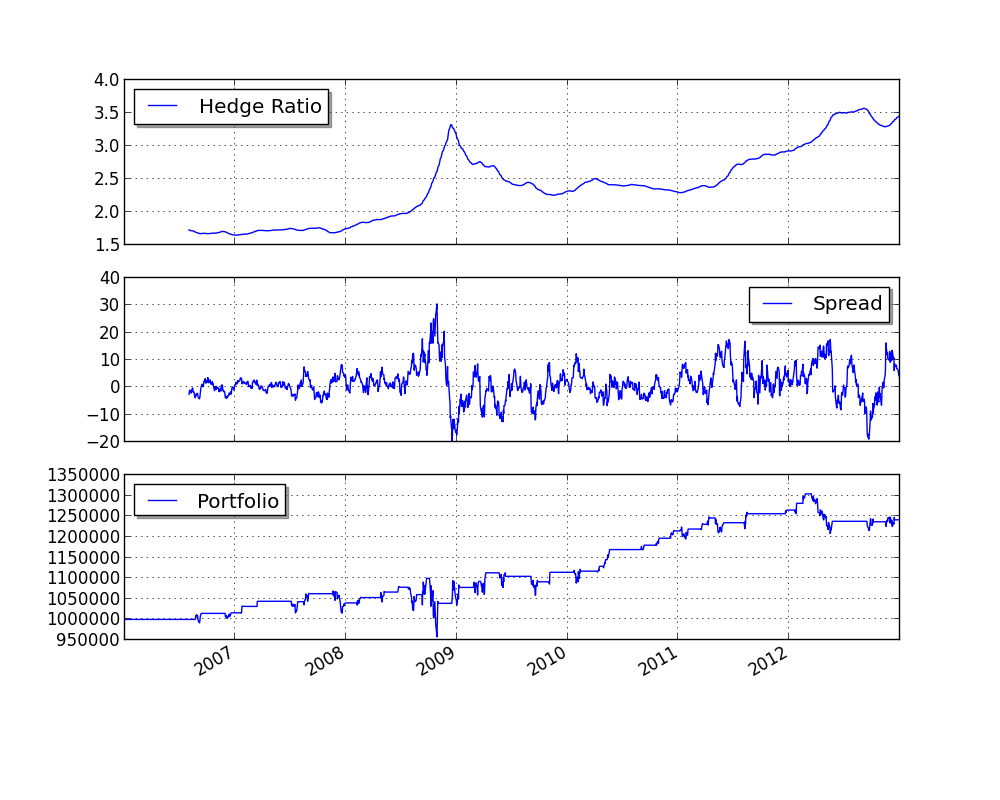Ernie Chan’s Gold vs. Gold Miners¶
- This example is based on:
from pyalgotrade import strategy
from pyalgotrade import dataseries
from pyalgotrade.dataseries import aligned
from pyalgotrade import plotter
from pyalgotrade.tools import yahoofinance
from pyalgotrade.stratanalyzer import sharpe
import numpy as np
import statsmodels.api as sm
def get_beta(values1, values2):
# http://statsmodels.sourceforge.net/stable/regression.html
model = sm.OLS(values1, values2)
results = model.fit()
return results.params[0]
class StatArbHelper:
def __init__(self, ds1, ds2, windowSize):
# We're going to use datetime aligned versions of the dataseries.
self.__ds1, self.__ds2 = aligned.datetime_aligned(ds1, ds2)
self.__windowSize = windowSize
self.__hedgeRatio = None
self.__spread = None
self.__spreadMean = None
self.__spreadStd = None
self.__zScore = None
def getSpread(self):
return self.__spread
def getSpreadMean(self):
return self.__spreadMean
def getSpreadStd(self):
return self.__spreadStd
def getZScore(self):
return self.__zScore
def getHedgeRatio(self):
return self.__hedgeRatio
def __updateHedgeRatio(self, values1, values2):
self.__hedgeRatio = get_beta(values1, values2)
def __updateSpreadMeanAndStd(self, values1, values2):
if self.__hedgeRatio is not None:
spread = values1 - values2 * self.__hedgeRatio
self.__spreadMean = spread.mean()
self.__spreadStd = spread.std(ddof=1)
def __updateSpread(self):
if self.__hedgeRatio is not None:
self.__spread = self.__ds1[-1] - self.__hedgeRatio * self.__ds2[-1]
def __updateZScore(self):
if self.__spread is not None and self.__spreadMean is not None and self.__spreadStd is not None:
self.__zScore = (self.__spread - self.__spreadMean) / float(self.__spreadStd)
def update(self):
if len(self.__ds1) >= self.__windowSize:
values1 = np.asarray(self.__ds1[-1*self.__windowSize:])
values2 = np.asarray(self.__ds2[-1*self.__windowSize:])
self.__updateHedgeRatio(values1, values2)
self.__updateSpread()
self.__updateSpreadMeanAndStd(values1, values2)
self.__updateZScore()
class StatArb(strategy.BacktestingStrategy):
def __init__(self, feed, instrument1, instrument2, windowSize):
strategy.BacktestingStrategy.__init__(self, feed)
self.setUseAdjustedValues(True)
self.__statArbHelper = StatArbHelper(feed[instrument1].getAdjCloseDataSeries(), feed[instrument2].getAdjCloseDataSeries(), windowSize)
self.__i1 = instrument1
self.__i2 = instrument2
# These are used only for plotting purposes.
self.__spread = dataseries.SequenceDataSeries()
self.__hedgeRatio = dataseries.SequenceDataSeries()
def getSpreadDS(self):
return self.__spread
def getHedgeRatioDS(self):
return self.__hedgeRatio
def __getOrderSize(self, bars, hedgeRatio):
cash = self.getBroker().getCash(False)
price1 = bars[self.__i1].getAdjClose()
price2 = bars[self.__i2].getAdjClose()
size1 = int(cash / (price1 + hedgeRatio * price2))
size2 = int(size1 * hedgeRatio)
return (size1, size2)
def buySpread(self, bars, hedgeRatio):
amount1, amount2 = self.__getOrderSize(bars, hedgeRatio)
self.marketOrder(self.__i1, amount1)
self.marketOrder(self.__i2, amount2 * -1)
def sellSpread(self, bars, hedgeRatio):
amount1, amount2 = self.__getOrderSize(bars, hedgeRatio)
self.marketOrder(self.__i1, amount1 * -1)
self.marketOrder(self.__i2, amount2)
def reducePosition(self, instrument):
currentPos = self.getBroker().getShares(instrument)
if currentPos > 0:
self.marketOrder(instrument, currentPos * -1)
elif currentPos < 0:
self.marketOrder(instrument, currentPos * -1)
def onBars(self, bars):
self.__statArbHelper.update()
# These is used only for plotting purposes.
self.__spread.appendWithDateTime(bars.getDateTime(), self.__statArbHelper.getSpread())
self.__hedgeRatio.appendWithDateTime(bars.getDateTime(), self.__statArbHelper.getHedgeRatio())
if bars.getBar(self.__i1) and bars.getBar(self.__i2):
hedgeRatio = self.__statArbHelper.getHedgeRatio()
zScore = self.__statArbHelper.getZScore()
if zScore is not None:
currentPos = abs(self.getBroker().getShares(self.__i1)) + abs(self.getBroker().getShares(self.__i2))
if abs(zScore) <= 1 and currentPos != 0:
self.reducePosition(self.__i1)
self.reducePosition(self.__i2)
elif zScore <= -2 and currentPos == 0: # Buy spread when its value drops below 2 standard deviations.
self.buySpread(bars, hedgeRatio)
elif zScore >= 2 and currentPos == 0: # Short spread when its value rises above 2 standard deviations.
self.sellSpread(bars, hedgeRatio)
def main(plot):
instruments = ["gld", "gdx"]
windowSize = 50
# Download the bars.
feed = yahoofinance.build_feed(instruments, 2006, 2012, ".")
strat = StatArb(feed, instruments[0], instruments[1], windowSize)
sharpeRatioAnalyzer = sharpe.SharpeRatio()
strat.attachAnalyzer(sharpeRatioAnalyzer)
if plot:
plt = plotter.StrategyPlotter(strat, False, False, True)
plt.getOrCreateSubplot("hedge").addDataSeries("Hedge Ratio", strat.getHedgeRatioDS())
plt.getOrCreateSubplot("spread").addDataSeries("Spread", strat.getSpreadDS())
strat.run()
print "Sharpe ratio: %.2f" % sharpeRatioAnalyzer.getSharpeRatio(0.05)
if plot:
plt.plot()
if __name__ == "__main__":
main(True)
this is what the output should look like:
2013-09-21 00:02:35,136 yahoofinance [INFO] Creating data directory
2013-09-21 00:02:35,136 yahoofinance [INFO] Downloading gld 2006 to data/gld-2006-yahoofinance.csv
2013-09-21 00:02:35,899 yahoofinance [INFO] Downloading gdx 2006 to data/gdx-2006-yahoofinance.csv
2013-09-21 00:02:36,637 yahoofinance [INFO] Downloading gld 2007 to data/gld-2007-yahoofinance.csv
2013-09-21 00:02:37,265 yahoofinance [INFO] Downloading gdx 2007 to data/gdx-2007-yahoofinance.csv
2013-09-21 00:02:37,881 yahoofinance [INFO] Downloading gld 2008 to data/gld-2008-yahoofinance.csv
2013-09-21 00:02:38,462 yahoofinance [INFO] Downloading gdx 2008 to data/gdx-2008-yahoofinance.csv
2013-09-21 00:02:39,243 yahoofinance [INFO] Downloading gld 2009 to data/gld-2009-yahoofinance.csv
2013-09-21 00:02:39,996 yahoofinance [INFO] Downloading gdx 2009 to data/gdx-2009-yahoofinance.csv
2013-09-21 00:02:40,577 yahoofinance [INFO] Downloading gld 2010 to data/gld-2010-yahoofinance.csv
2013-09-21 00:02:42,630 yahoofinance [INFO] Downloading gdx 2010 to data/gdx-2010-yahoofinance.csv
2013-09-21 00:02:43,397 yahoofinance [INFO] Downloading gld 2011 to data/gld-2011-yahoofinance.csv
2013-09-21 00:02:44,153 yahoofinance [INFO] Downloading gdx 2011 to data/gdx-2011-yahoofinance.csv
2013-09-21 00:02:44,901 yahoofinance [INFO] Downloading gld 2012 to data/gld-2012-yahoofinance.csv
2013-09-21 00:02:45,965 yahoofinance [INFO] Downloading gdx 2012 to data/gdx-2012-yahoofinance.csv
Sharpe ratio: -0.20
and this is what the plot should look like:

You can get better returns by tunning the window size as well as the entry and exit values for the z-score.